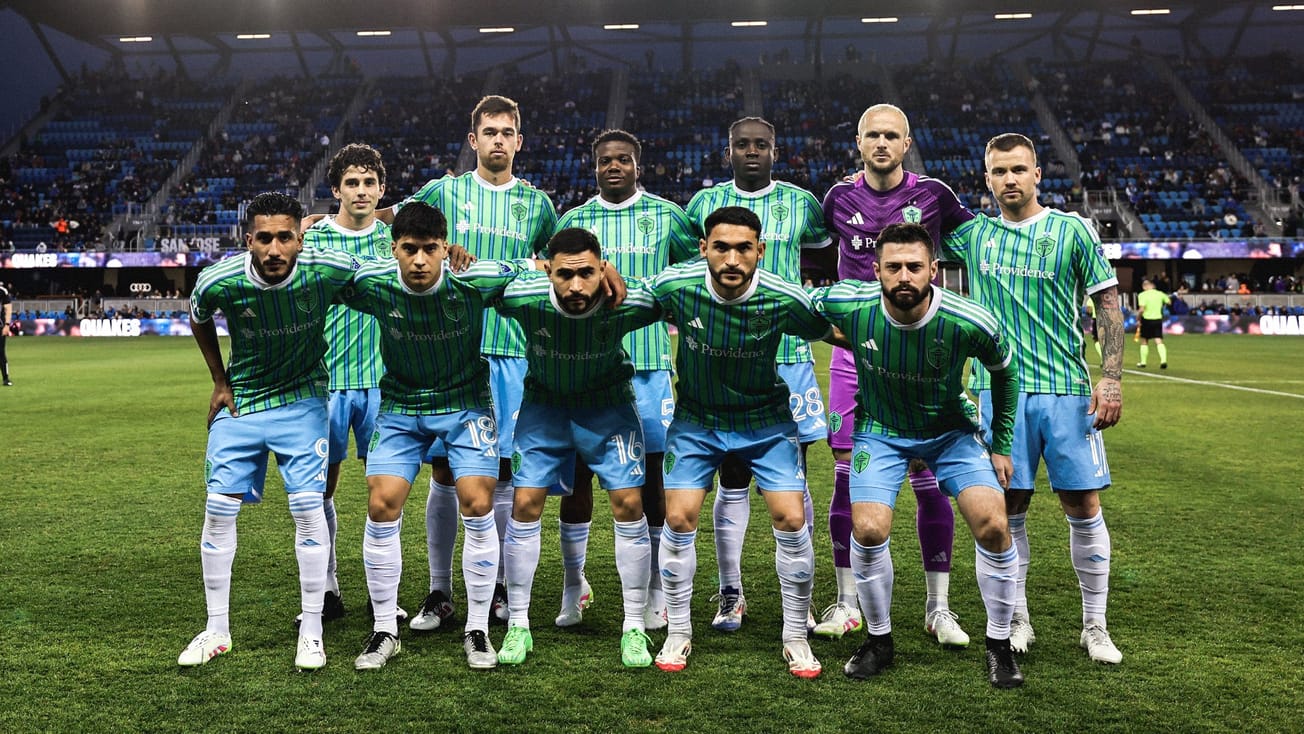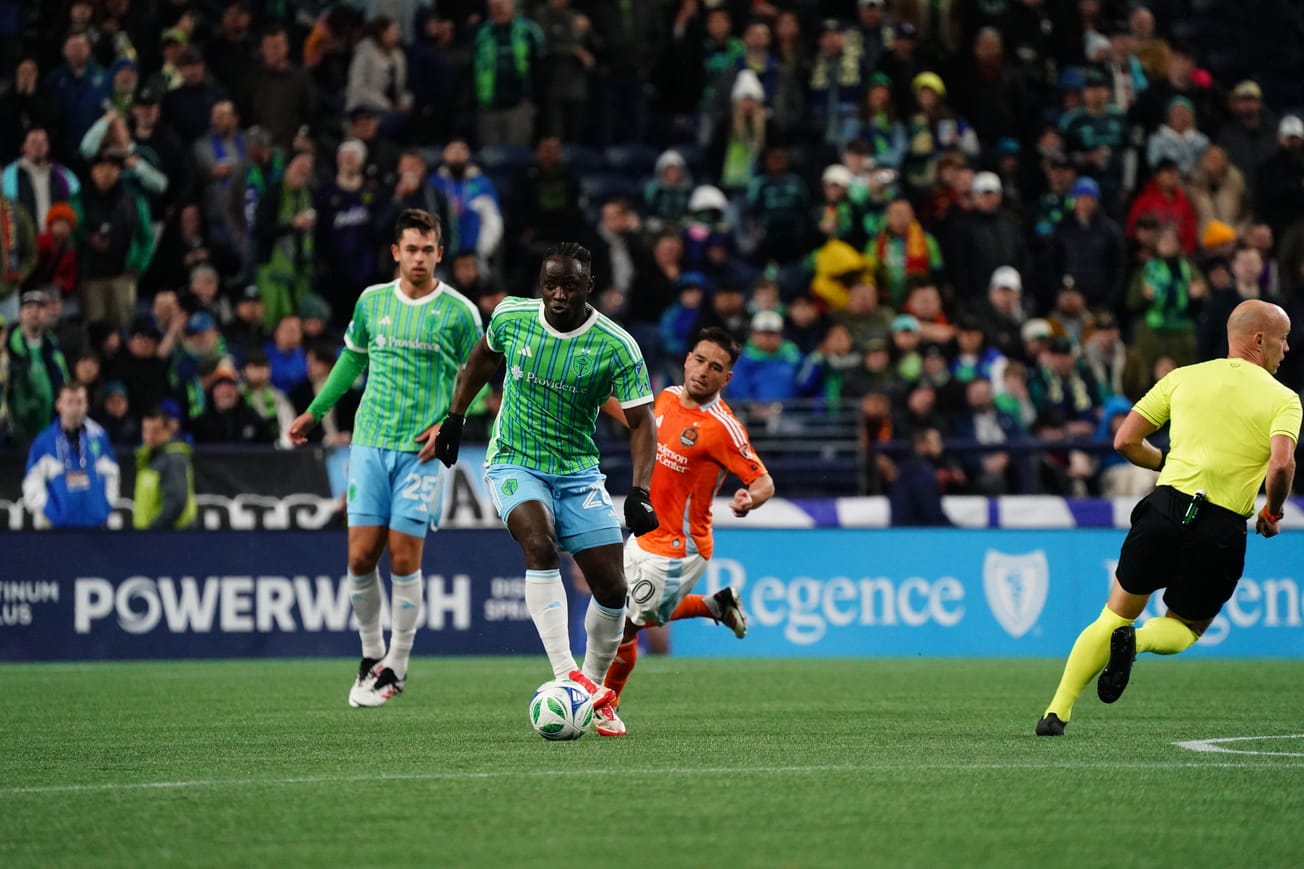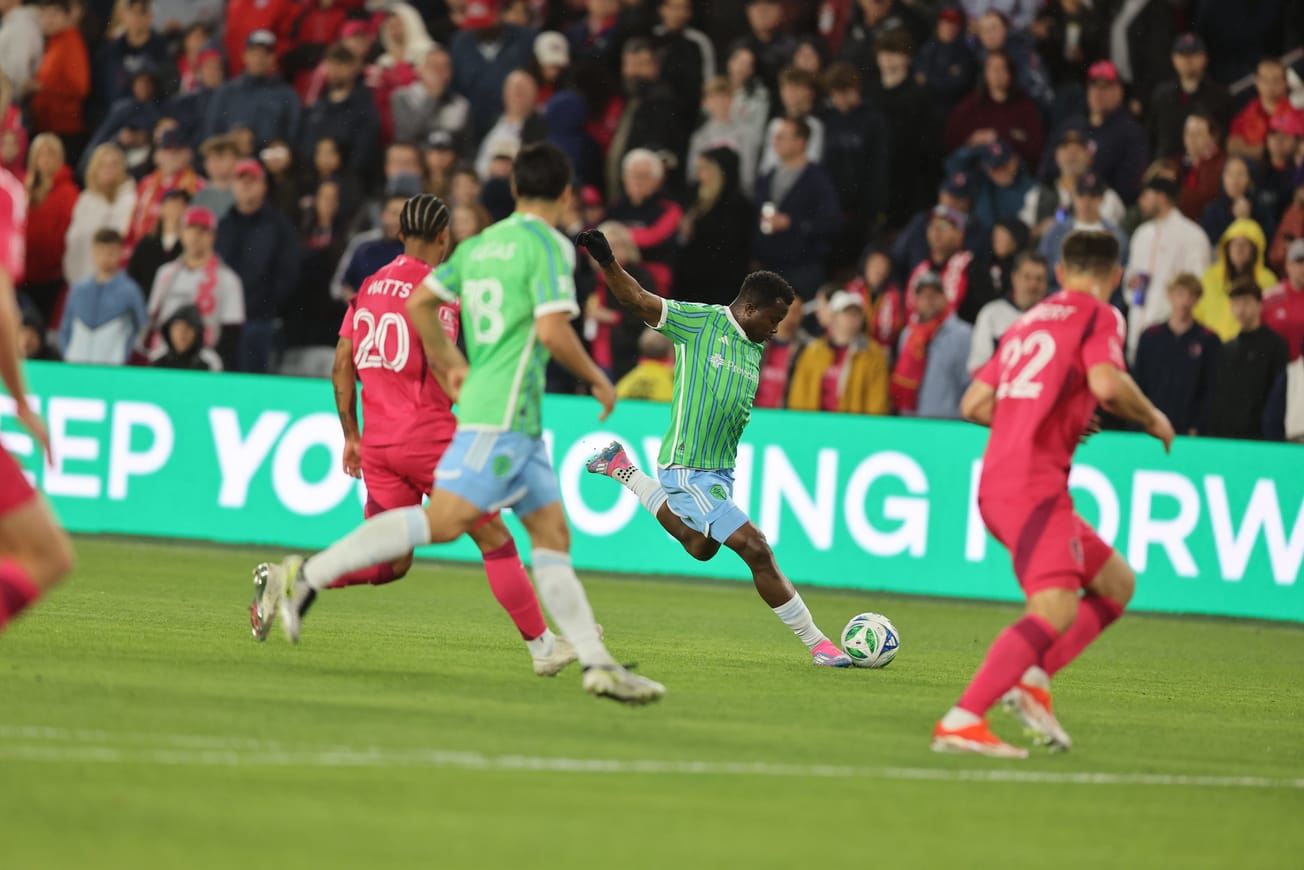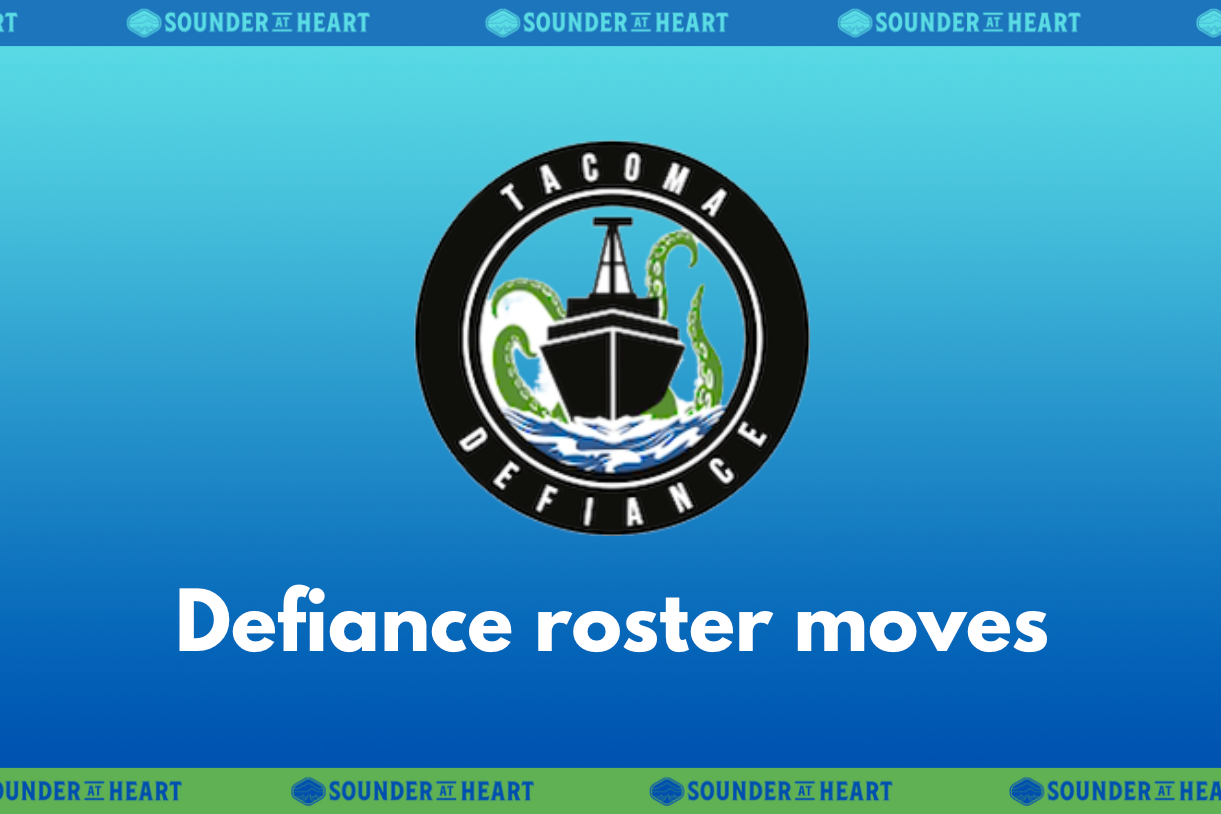#14 Cody Baker – 5.67 in 12 appearances
Community rating – 5.81
MOTM = 0 High = 7 Low = 5
Cody Baker was a relative unknown who took his chance and ran with it. With no first team experience, Baker burst onto the scene at age 19 and ended with 12 appearances and 680 minutes in MLS. He combined that with 413 minutes for Tacoma Defiance, including a perfect 100 percent tackle rate in MLS Next. His MLS play was an excellent mixture of hard-nosed defense and creative attacking that at times was at odds with a struggling Sounders team around him. Hard tackling and aggression defined his defensive work, and he excelled at both progressive passing and receiving forward passes. In May through July, Cody saw all his appearances for Seattle, playing equally at left and right back, before injury and other players returning led to Baker fading from Seattle’s plans for the rest of the season.
What I liked: With his incredible aggressive play, Baker was a breath of fresh air. He played with enthusiasm and neatly combined solid defending with brash pressing flair. Not afraid to attack on the dribble, Cody showed a diverse two-way ability in 2023. His first match was as a substitute left back against SKC with Seattle looking abjectly horrible. Baker was part of a resurgence, as he repeatedly stuffed Johnny Russell before leading some breakout transition moments, often displaying beautiful dribbling forays forward and confident distribution. He followed this up with a 96-touch, 92 percent distribution start against Houston where he repeatedly pushed the ball into the attack. His highest-rated match came against the Red Bulls, as Cody earned a 7 grade via fantastic play on the defensive left. This grade was based on lockdown defensive work which led to a shutout, even as Seattle played a man down for the last 25 minutes. Baker was third in both progressive passes and progressive carries, consistently moving the ball into fortuitous attacking areas: the two players ahead of him in those stats? JP and Nico. This combination of physical defense and aggressive attacking play was an excellent introduction to this young, breakout talent.
What I didn’t like: Just as he was making a name for himself, Cody got injured and subsequently became a forgotten member of the team, passed by others who took any available minutes that he had been using. The fullbacks on this team were part of a record-breaking defensive unit, so it made sense not to change it up for development, but that meant there weren’t minutes for Cody when everyone was healthy and ready to go. Defensively, Baker is a strong player who uses his physicality well, which shows up in his tackle numbers, but he has poor blocking and interception numbers, which tend to be indicators of anticipation and pace. For all his aggression and quality dribbling numbers, the payoff didn’t materialize, and Cody doesn’t yet have the service and creation as the end product of his work further down the field. This led to him getting in good spots but not making decisions that directly helped the team on the scoreboard, probably another reason why he was relegated to the bench after others were healthy.
Moving forward: On a low salary with options for the future, Baker doesn’t have the “in your face” upside of a few of the other young players brought up from Defiance, but he scored higher than them for a reason: he does a lot of important things well. While not necessarily slow, he isn’t yet creating turnovers from his tactical understanding of the game, and he’ll need to work on developing more than his physical play. If he can learn the patterns and movement needed for higher level anticipation, Cody can use that to be a force transitioning from defense to offense. Right now he does well in the middle range of fullback needs, but must hone those high-end abilities to differentiate himself from a deep defensive group. His ability to play on either side is an excellent asset, and he can develop into a quality depth piece with a good chance to raise it another level by learning some more dynamic play.
#13 Léo Chú – 5.97 in 36 appearances
Community rating – 6.23
MOTM = 5 High = 9 Low = 4
The biggest improvement on the year came from Léo Chú; he had a massive jump from a 5.1 rating in 2022 to nearly 6 this year, the biggest jump on the team. Along with that came excellent growth in direct output numbers: He ranked second in both goals (five) and assists (eight). He added 31 key passes, third highest on the team. What changed? His aggression was similar to previous years but was more refined, his distribution was better, and his decision-making was much improved. This added up to a dynamic winger who could either receive the ball and go directly at defenders off the dribble to create chances, or run into space and attack with pace better than most in the league. Léo combined these skills to be a forward momentum creator, incessantly pushing the ball into the attacking third, attacking the wide areas, and delivering quality service into the box.
What I liked: Rating a 9 in just his third match of the season, Chú announced his arrival at the MLS stage with a brilliant four-assist match. His ability to run down the left wing around and through defenders brought Seattle back from a 1-0 deficit early against SKC to a dominant 4-1 win. Each time Léo pushed into the attack he was aggressive on goal, and each time he found a willing partner in Jordan Morris. Every assist in this match was to Morris, as the two combined to be completely undefendable. This was a wake-up call to the league, as Chú showed an elite ability to dribble at pace against right backs like he hadn’t done before. Adjusting to his predilection for going down the line defensively meant he was given central options, and it was through these that Chú attacked directly on goal, showing a surprising right-footed shot which led to most of his goals scored. With five MOTM performances, Léo Chú showed he can not only be a strong creator, he can be the attacking impetus for the entire team.
What I didn’t like: Clearly, the consistency wasn’t there. Léo’s overall rating was hurt by a number of well below-average performances. Contrary to the tremendous upside illustrated above, he had a penchant to disappear, or not appear at all, in some matches. Whether that is age or demeanor, the team can’t afford a key offensive piece being absent from matches. At times, Chú was his own worst enemy, like when he made horrific decisions that resulted in a home sending off against hated Portland, gifting them a way back into a match that should have been a solid Sounders win. Léo may have been exposed in the playoffs as too much of a “one-trick-pony”— teams were able to defend his usual skill moves and negate any effectiveness by double-teaming him or daring him to make the right tactical play. That decision-making can be coached into a player, but continually doing the same thing that isn’t working was frustrating for all involved. His defensive work rate was very low for a team defined by two-way players, and this often put undue pressure on teammates who expected more.
Moving forward: Still young and praised highly by coach Schmetzer, Léo looks to have a high ceiling and potential. Developing multiple facets of attack, learning how to defend better as a teammate, and combining more directly are clear paths to improvement. If the rumors are true, Chú may not be an every day starter, which takes some pressure off. He has a number of fantastic qualities that you can't teach, namely speed and dribbling ability 1-v-1, which will always have value. His challenge will be to add another few tools to his playstyle, hopefully starting with off-ball and backside effectiveness, diversifying his attack, and combining more fluidly with others outside of Jordan Morris.
#12 Stefan Cleveland – 6.00 in 2 appearances
Community rating – 6.63
MOTM = 0 High = 7 Low = 5
Once again rating MLS average, the Sounders showed that Cleveland was a consistent backup option for incumbent Stefan Frei. In 24 appearances across the last three years, he has proven that he is a quality MLS player and has the full body of work to show that. That body of work has dwindled, however, as only two appearances in 2023 demonstrated both the resilience of Frei ahead of him, and the likely lack of opportunity going forward for an ambitious player like Cleveland. He was fine for Seattle this year, playing well in a win and then just okay in a loss during his back-to-back away starts in mid-July.
What I liked: The 7 rating was part of a team effort against Vancouver as Seattle battled to a 3-2 win. He had three very important saves to keep Seattle in a close match that was ultimately decided by a 91st minute Yeimar goal. One of the saves came as Ryan Gauld nearly won the match for Vancouver, requiring some excellent anticipation by Stefan to stuff the Vancouver DP and allow Seattle the opportunity for those late heroics. A solid player with his feet, Cleveland does a lot of little things right, as expected from a Sounders keeper, with strong positioning and excellent distribution. This allows him to be more of a game manager than a stand-on-his-head keeper.
What I didn’t like: There was a bit of a ceiling on Stefan’s growth, whether due to lack of opportunity or otherwise. This meant that while he was a solid backup for Frei, Cleveland never did anything to broach the subject of replacing him. The awe-inspiring athleticism or shot-stopping that would have been necessary to supplant someone of Frei’s ability wasn’t there with Cleveland. While Stef-2 might be a little better with his feet, his decision-making on when to come out was a little suspect and at times overzealous, leading to a few too many unforced mistakes. When presented with an opportunity to change the narrative about his play and demand more of a look, Stef earned a 5 in a dismal 2-0 loss to the lowly San Jose Earthquakes in mid July, and he wasn’t needed again.
Moving forward: With a number of years under his belt, it’s time to give Stefan Cleveland the opportunity to get starts elsewhere that he won’t get any time soon behind a guy setting team shutout records. Although a very solid backup, without an overwhelming upside or potential there isn’t a lot about Cleveland that we don’t know, and unfortunately for him, his play wasn’t better than the guy in front of him. Due to the consistent excellence of Keeper #1, moving on from Cleveland is likely best for both parties. He was tutored under a perennial GKOTY mentor, trained by the best goalkeeping coach in the country, and groomed by a league-leading organization. This sets him up well to move on to another team and see if he can take that next step, while allowing Seattle to determine what depth and options they have in the pipeline.
#11 Alex Roldan – 6.00 in 32 appearances
Community rating – 6.13
MOTM = 2 High = 8 Low = 4
Alex Roldan had another iron man year at right back, with 32 impactful appearances as part of a dominant defensive back line. Credited with one goal and two assists in 2023, his output was a slight dropoff from the previous season, but the younger Roldan again proved he’s an integral part of Seattle’s success on both ends of the field. Continually one of the team leaders in touches, much of the possession critical to the Sounders’ success came through connecting passes via Alex Roldan. He was a great example of a defensive player who defended through possession and attacking positioning, while understanding when to be aggressive vertically and when not.
What I liked: Roldan assisted on both goals in a 2-0 win against Real Salt Lake on March 4th, as part of a MOTM performance where he assumed the role of creator and distributor. When Alex is on, he is the perfect wide fullback for this iteration of Sounders: able to defend opportunistically to create transition chances, a key contributor to intricate linkup play with his brother and central players, a wide direct threat, and a pinpoint-accurate crosser from the corner or cutback switching-pass dealer. Against RSL, he got into dangerous areas and found the right pass for others to finish. When given the chance himself, Alex can smash a backside shot, as evidenced later in the season when RBW found him. So much of Seattle’s offense has tended to the left (first with Nico, then Chú), that having a strong possession element able to balance the field out is essential, and Alex was great at doing that.
What I didn’t like: For as effective as his combination is with Cristian, the consistency wasn’t there with other players, and when Cristian was out injured Alex didn’t develop enough chemistry with his replacements. Perhaps due to this, his assist numbers didn’t materialize for much of the season; as much as Alex can drive the offense from a deep position, he must accept some of the blame for the offensive struggles. Defensively, Roldan was solid but unspectacular, relying on the exquisite Yeimar to release him from consistent defensive needs and allow combination play on the wing. Alex’s strong interception numbers showed this aggression, but a lack of tackles and physical play meant there were times he was caught upfield, demanding perfection from those behind him. As we saw in the last match of the year, that doesn’t always work.
Moving forward: For the first time in a few years there are some younger players nipping at Alex’s heels, as he has multiple teammates who project well to outside back. While these other players are not as polished as Alex and don’t have the intuitive connection with Cristian on the wing, competition does give Alex opportunity for relief as his strong international play has added much to his busy soccer plate. Look for Alex to excel if Seattle adds more goal scoring from the opposite wing, giving him multiple targets from his quality interplay in the wide areas and deadly service, as well as opportunistic back-post finishing creation from center-left.










